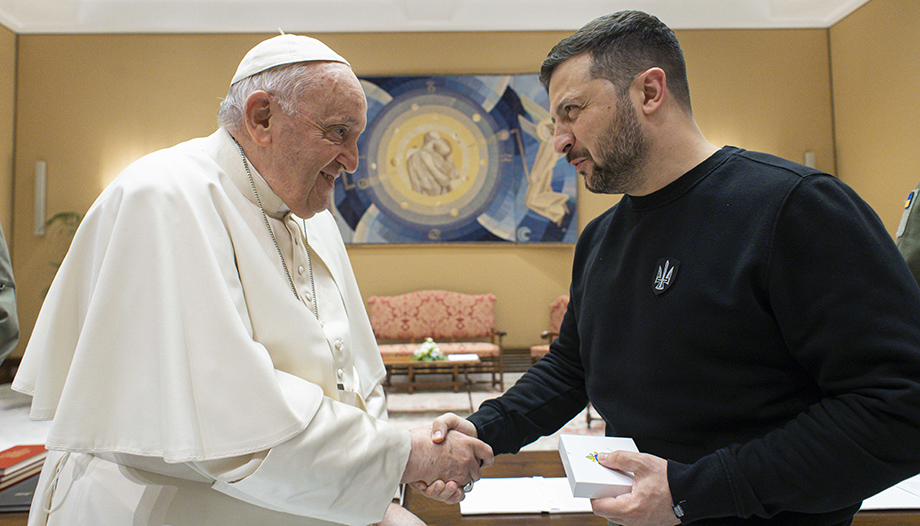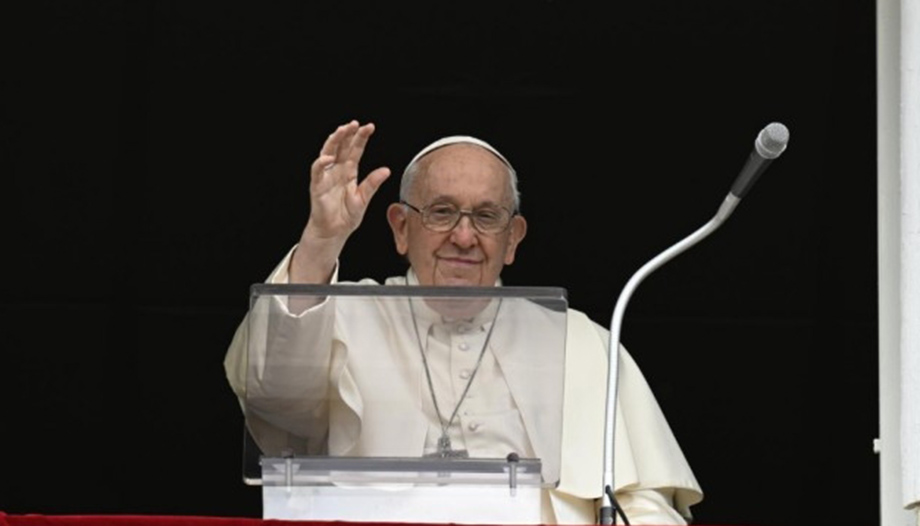At the end of the recitation of the Marian prayer of the Regina Caeli, Pope Francis yesterday in St. Peter's Square, referring to "the truce just reached" between Israelis and Palestinians, "let the guns fall silent". A petition also referring, no doubt, to the Ukraine warwhose president Volodimir Zalenski was received yesterday by the Pope at the Vatican, an audience we report on below.
"In recent days we have once again witnessed armed clashes between Israelis and Palestinians, in which innocent people, including women and children, have lost their lives. I hope that the recently reached truce will be stabilized, that the weapons will be silenced, because weapons will never bring security or stability; on the contrary, they will destroy all hope for peace," the Holy Father said.
At the end of his remarks, he turned to the Virgin Mary "asking her to alleviate the sufferings of the martyred Ukraine, and of all nations wounded by war and violence".
We remind you that last SundayAfter praying the Regina Caeli, the Pope asked the Romans and pilgrims: "Let us pray the rosary asking the Holy Virgin for the gift of peace, especially for the tormented Ukraine. May the leaders of nations hear the cry of the people who desire peace".
Greetings and applause to the moms.
Earlier, the Pope warmly greeted all the faithful gathered in St. Peter's Square, Romans and pilgrims from many countries. In particular, he stressed, "to the faithful from Canada, Singapore, Malaysia and Spain; to the leaders of the Community of Sant'Egidio in 25 African countries; to the authorities and professors of the Radom University in Poland; to Caritas InternationalisThe meeting, which met to elect the new president: forward, with courage, on the path of reform", and numerous Italian pilgrims.
The Pontiff also had words for "the feast of the Mother that is celebrated today in so many countries. "Let us remember with gratitude and affection all mothers, those who are still among us and those who have gone to heaven. Let us entrust them to Mary, the mother of Jesus. Let us give them a round of applause," the Pope asked.
"The Holy Spirit does not leave us alone."
In its address The Pope recalled that "today's Gospel, sixth Easter Sunday, speaks to us of the Holy Spirit, whom Jesus calls the Paraclete (cf. Jn 14:15-17). Paraclete is a word that means at the same time the one who consoles y lawyer. The Holy Spirit does not leave us alone, he is with us, like a lawyer who assists the accused by his side. And he suggests to us how to defend ourselves against the one who accuses us. Let us remember that the great accuser is always the devil, who puts within us the desire for sin, sins, evil. Let us reflect on these two aspects: his closeness and his help against the one who accuses us".
With regard to his closeness, the Pope noted that "the Holy Spirit wants to stay with us: he is not a passing guest who comes to pay us a courtesy visit. He is a companion of life, a stable presence, he is Spirit and desires to dwell in our spirit. He is patient and is with us even when we fall. He stays because he truly loves us, he does not pretend to love us and then leave us alone in the midst of difficulties.
"Moreover, if we find ourselves in a situation of trial, the Holy Spirit consoles us, bringing us God's forgiveness and strength. And when he confronts us with our errors and corrects us, he does so gently: in his voice, which speaks to the heart, there is always present the timbre of tenderness and the warmth of love. Of course, the Paraclete Spirit is demanding, because he is a true friend, faithful, who hides nothing, who suggests to us what to change and how to grow. But when he corrects us, he never humiliates us and never discourages us; on the contrary, he transmits to us the certainty that with God we can always succeed. This is his closeness," he added.
As for the second aspect, "the Paraclete Spirit, as our advocate, defends us from those who accuse us: from ourselves when we do not love ourselves and do not forgive ourselves, perhaps even going so far as to tell ourselves that we are good-for-nothing failures; from the world, which discards those who do not respond to its schemes and models; from the devil, who is the "accuser" par excellence (cf. Rev 12:10) and the one who divides, and who does everything possible to make us feel incapable and unhappy".
"We are beloved children of God."
In the face of these accusatory thoughts, the Holy Spirit suggests to us how to respond, Pope Francis continued. "In what way? The Paraclete, Jesus says, is the One who teaches us and reminds us of all that Jesus has told us (cf. Jn 14:26). He reminds us of the words of the Gospel, and thus enables us to respond to the accusing devil not with our own words, but with the very words of the Lord."
"Above all," he continued, "he reminds us that Jesus always spoke of the Father in heaven, who made him known to us and revealed his love for us, his children. If we invoke the Spirit, we will learn to welcome and remember the most important reality of life, which protects us from the accusations of evil: we are beloved children of God."
"Brothers and sisters, let us ask ourselves today: do we invoke the Holy Spirit, do we pray to him often, let us not forget him, who is beside us, indeed, within us! And likewise, do we pay attention to his voice, both when he encourages us and when he corrects us? Do we respond with the words of Jesus to the accusations of evil, to the 'tribunals' of life? Do we remember that we are beloved children of God? May Mary make us docile to the voice of the Holy Spirit and sensitive to his presence," he concluded.
The Pope, again with Zelenski
Pope Francis received Ukrainian President Volodimir Zelenski at the Vatican yesterday evening, the feast of Our Lady of Fatima, in a meeting with the President of the Republic of Ukraine, Volodimir Zelenski. meeting which lasted 40 minutes. In the morning, the leader of the "martyred" Ukraine, as Pope Francis calls it in his speeches and homilies, met in Rome with President Sergio Mattarella and Prime Minister Giorgia Meloni, who has pledged strong support for Kiev.
This is the second time that President Zelenski has visited the Vatican. The first was in February 2020, when the threat of the Covid 19 pandemic was beginning to loom over Europe and the war seemed to affect only eastern Ukraine.
A year and a half after the first Russian bombardment of Kiev, Zelenski traveled again, and, in an itinerary that touched several European capitals, made a stop in Rome, "Thank you for this visit," said the Pope to Zelenski, welcoming him shortly after 4:00 p.m. in the Paul VI Hall, to whose courtyard he had arrived in an armored car. Sitting face to face, they began their conversation in the presence of an interpreter.
The director of the Vatican Press Office, Matteo Bruni, informed journalists that "the topics of the conversation dealt with the humanitarian and political situation in Ukraine caused by the ongoing war. The Pope assured his constant prayers, as shown by his numerous public appeals and his continuous invocation to the Lord for peace since February last year."
The Holy Father and the President of Ukraine "agreed on the need to continue humanitarian efforts to support the population. The Pope particularly emphasized the urgent need for 'gestures of humanity' towards the most fragile people, the innocent victims of the conflict."
Other sources add that Pope Francis put a ceasefire on the table and Volodimir Zelenski his ten-point peace plan, which includes Russia's withdrawal from its Ukrainian positions.

An encyclical from the Pope, and a bulletproof plaque from Zelenski
In the exchange of gifts, Pope Francis donated to Zelenski a bronze work representing an olive branch, symbol of peace, the official Vatican agency reported. Along with it, the Message for the World Day of Peace 2023, the Document on Human Fraternity, the book on the Statio Orbis March 27, 2020 in St. Peter's Square, edited by Libreria Editrice Vaticana (LEV), and the volume 'An Encyclical on Peace in Ukraine', which collects most of the Pontiff's public speeches on the war in Ukraine.
The gifts presented by President Zelenski to the Holy Father were also significant: a work of art made from a bulletproof plate and a painting entitled 'Perdita', about the killing of children during the conflict.
With Gallagher. Parolin in Fatima
Immediately afterwards, Ukrainian President Zalenski met with the Secretary for Relations with States and International Organizations, Monsignor Paul Richard Gallagher, with whom "the current war in Ukraine and the urgencies associated with it, in particular those of a humanitarian nature, as well as the need to continue efforts to achieve peace, were discussed first of all". The Holy See Press Office also reported that "the occasion was also propitious to discuss some bilateral issues, especially with regard to the life of the Catholic Church in the country".
Cardinal Pietro Perolin, Secretary of State, was at the FatimaCardinal Parolin, leading the traditional pilgrimage on the feast of Our Lady of Fatima. Vatican diplomacy is "making every effort to help peace," said Cardinal Parolin, Referring to his participation in the pilgrimage, he noted that "peace is also achieved through prayer and penance." "We must not forget the authentic weapons that Our Lady has indicated to us," he added, "that is why I consider it an opportune moment to be in Fatima."







